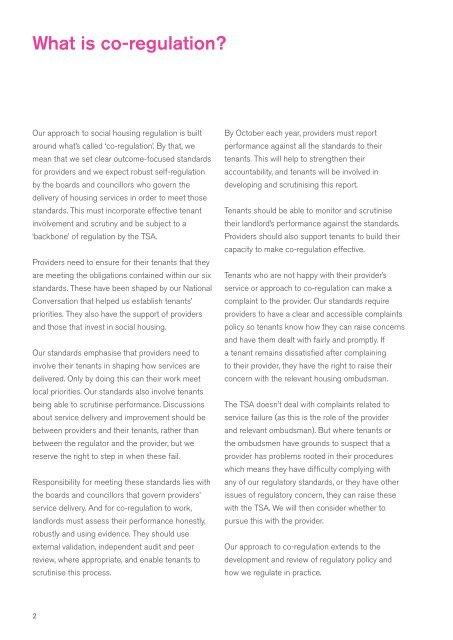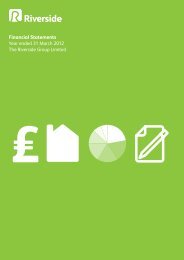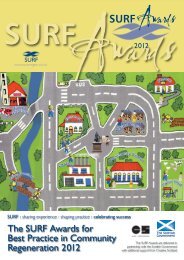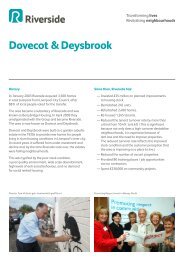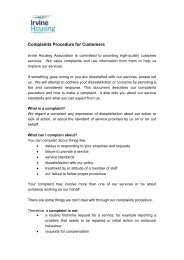What does the regulatory framework mean for you? - Riverside
What does the regulatory framework mean for you? - Riverside
What does the regulatory framework mean for you? - Riverside
You also want an ePaper? Increase the reach of your titles
YUMPU automatically turns print PDFs into web optimized ePapers that Google loves.
<strong>What</strong> is co-regulation?<br />
Our approach to social housing regulation is built<br />
around what’s called ‘co-regulation’. By that, we<br />
<strong>mean</strong> that we set clear outcome-focused standards<br />
<strong>for</strong> providers and we expect robust self-regulation<br />
by <strong>the</strong> boards and councillors who govern <strong>the</strong><br />
delivery of housing services in order to meet those<br />
standards. This must incorporate effective tenant<br />
involvement and scrutiny and be subject to a<br />
‘backbone’ of regulation by <strong>the</strong> TSA.<br />
Providers need to ensure <strong>for</strong> <strong>the</strong>ir tenants that <strong>the</strong>y<br />
are meeting <strong>the</strong> obligations contained within our six<br />
standards. These have been shaped by our National<br />
Conversation that helped us establish tenants’<br />
priorities. They also have <strong>the</strong> support of providers<br />
and those that invest in social housing.<br />
Our standards emphasise that providers need to<br />
involve <strong>the</strong>ir tenants in shaping how services are<br />
delivered. Only by doing this can <strong>the</strong>ir work meet<br />
local priorities. Our standards also involve tenants<br />
being able to scrutinise per<strong>for</strong>mance. Discussions<br />
about service delivery and improvement should be<br />
between providers and <strong>the</strong>ir tenants, ra<strong>the</strong>r than<br />
between <strong>the</strong> regulator and <strong>the</strong> provider, but we<br />
reserve <strong>the</strong> right to step in when <strong>the</strong>se fail.<br />
Responsibility <strong>for</strong> meeting <strong>the</strong>se standards lies with<br />
<strong>the</strong> boards and councillors that govern providers’<br />
service delivery. And <strong>for</strong> co-regulation to work,<br />
landlords must assess <strong>the</strong>ir per<strong>for</strong>mance honestly,<br />
robustly and using evidence. They should use<br />
external validation, independent audit and peer<br />
review, where appropriate, and enable tenants to<br />
scrutinise this process.<br />
By October each year, providers must report<br />
per<strong>for</strong>mance against all <strong>the</strong> standards to <strong>the</strong>ir<br />
tenants. This will help to streng<strong>the</strong>n <strong>the</strong>ir<br />
accountability, and tenants will be involved in<br />
developing and scrutinising this report.<br />
Tenants should be able to monitor and scrutinise<br />
<strong>the</strong>ir landlord’s per<strong>for</strong>mance against <strong>the</strong> standards.<br />
Providers should also support tenants to build <strong>the</strong>ir<br />
capacity to make co-regulation effective.<br />
Tenants who are not happy with <strong>the</strong>ir provider’s<br />
service or approach to co-regulation can make a<br />
complaint to <strong>the</strong> provider. Our standards require<br />
providers to have a clear and accessible complaints<br />
policy so tenants know how <strong>the</strong>y can raise concerns<br />
and have <strong>the</strong>m dealt with fairly and promptly. If<br />
a tenant remains dissatisfied after complaining<br />
to <strong>the</strong>ir provider, <strong>the</strong>y have <strong>the</strong> right to raise <strong>the</strong>ir<br />
concern with <strong>the</strong> relevant housing ombudsman.<br />
The TSA <strong>does</strong>n’t deal with complaints related to<br />
service failure (as this is <strong>the</strong> role of <strong>the</strong> provider<br />
and relevant ombudsman). But where tenants or<br />
<strong>the</strong> ombudsmen have grounds to suspect that a<br />
provider has problems rooted in <strong>the</strong>ir procedures<br />
which <strong>mean</strong>s <strong>the</strong>y have difficulty complying with<br />
any of our <strong>regulatory</strong> standards, or <strong>the</strong>y have o<strong>the</strong>r<br />
issues of <strong>regulatory</strong> concern, <strong>the</strong>y can raise <strong>the</strong>se<br />
with <strong>the</strong> TSA. We will <strong>the</strong>n consider whe<strong>the</strong>r to<br />
pursue this with <strong>the</strong> provider.<br />
Our approach to co-regulation extends to <strong>the</strong><br />
development and review of <strong>regulatory</strong> policy and<br />
how we regulate in practice.<br />
2


